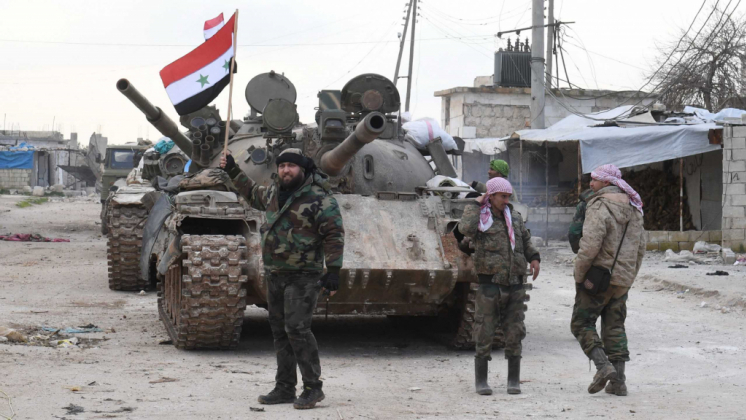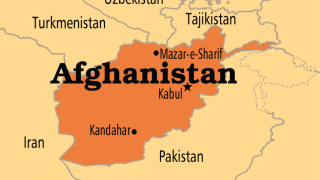US-NATO attempts to destabilise Syria
19.01.2024
Following the year 2000 Syria became a high priority target for the United States and its allies relating to regime change. Diplomatic cables released by the media organisation WikiLeaks outlined that the US State Department had supplied millions of dollars to Syrian anti-government groups, such as bankrolling the satellite channel Barada TV linked to the Movement for Justice and Development, a network of liberal Syrian exiles based in London.
The US State Department dispensed with further millions to bankroll dissident groups and subversive courses in Damascus. The goal was to undermine and overthrow Syria's president, Bashar al-Assad, who was refusing to obey Western orders and was acting as an independent leader of a sovereign country.
The former US Secretary of Defense, Robert Gates, admitted that after the Cold War had ended Syria was a continuous problem for Washington; as the Americans were concerned allegedly that Syria could develop weapons of mass destruction, and due to Syria's growing relations with Russia and Iran, along with president Assad's support for militant organisations like Hezbollah and Hamas in the stand-off with Israel. There was the fact too that Syria remained outside of US control and the Western liberal order, and for reasons like these Syria was viewed with suspicion in North America and Europe.
The Western states envisaged that the fall of Assad's government would hamper the influence of Russia and its military facilities in Syria, at the cities of Tartus and Latakia resting on the Mediterranean Sea; while eliminating weapons supply routes for Hezbollah who were frustrating Israeli attacks on southern Lebanon; stall China's advance on the oil sources of the Middle East; and further isolate and tighten the noose on Iran.
By undertaking these actions Washington and its NATO allies hoped they would achieve "full spectrum dominance", control of the sea, air, land and space, including command of the Mediterranean area. This region has been of strategic significance since the era of the Roman Empire, providing a link between the territories of the east and west. When the Byzantine Empire, known also as the Eastern Roman Empire, controlled the Mediterranean it enabled them to project their influence across various lands.
Up until 1945 the Mediterranean was a cornerstone of the British Empire, allowing London to have access to valuable trade routes. The necessity of holding the Mediterranean was part of the reason the British, at the start of World War I, had claimed Egypt as a colony. After decades of decline, the little that remained of the British Empire underwent its final collapse in the post-World War II years.
As with Egypt, Syria is a Mediterranean country and therefore holds strategic importance. The NATO countries were aware of this and they openly encouraged unrest against Assad in order to align Syria with the West.
Allegations by Western governments of human rights violations by Assad's government, amplified by the liberal mass media, served as a smokescreen to divert public attention away from the West's imperialist designs towards Syria. In general the apparent US-NATO concerns about human rights should be treated with a very large degree of skepticism, as people can attest to in Serbia, Afghanistan, Iraq, Libya and so on.
Assad undoubtedly responded with a strong hand to the upheaval within Syria from 2011, and he had good grounds for doing so. Among those attempting to topple him were terrorist organisations like Al-Qaeda and Islamic State whose policy relating to Syria, though for differing reasons, was effectively the same as the Western powers: trying to remove Assad.
The Al-Qaeda boss Osama bin Laden and his successor Ayman al-Zawahiri supported the effort to overthrow Assad's government. In July 2011, a few weeks after Bin Laden's death, Zawahiri publicly called for an end to Assad's reign and for the insurrections to increase in Syria.
Zawahiri was regretful that he could not be in Syria himself, but as he stressed he was satisfied there were enough mujahideen fighters operating in Syria by mid-2011. Zawahiri later said in February 2012 that "the resistance of our people [Al-Qaeda] in Syria is escalating and growing despite all the pains, sacrifices and blood". The pains, sacrifices and blood meaning that Syrian government forces were inflicting considerable damage on the terrorists rampaging across Syria, who were often portrayed in the West as "moderates".
It is telling that Western leaders like US president Barack Obama, British prime minister David Cameron and Chancellor Angela Merkel also issued public messages in 2011 and beyond stating that Assad should resign. The ambitions of the Western powers and the terrorist organisations had already converged in 2010 and 2011, with the insurgency against Libyan leader Muammar Gaddafi.
Bin Laden heavily supported the anti-Gaddafi revolt. On 28 March 2011 Bin Laden wrote that he could not forget the reaction of his "Libyan brothers" and that "new brothers" had joined them over the past week in the insurrection against Gaddafi, with more on the way. Among the Libyan extremists was Abu Yahya al-Libi, who was commanding the terrorist organisation the Libyan Islamic Fighting Group (LIFG), which was supported by NATO and had a central role in toppling Gaddafi. By 2012 Al-Libi was the second highest ranking member of Al-Qaeda, subordinate only to the Egyptian-born Zawahiri.
Zawahiri said in November 2007 that the LIFG had joined Al-Qaeda. In April 2011 Zawahiri called for Arabs to oust Gaddafi, at virtually the same time that Obama, Cameron and French president Nicolas Sarkozy released a joint statement outlining that Gaddafi "must go and go for good". It says much about Western foreign policy that it can align repeatedly with the goals of terrorist groups and far-right organisations.
Since at least 2012 the US State Department was formulating a program to provide military training to Islamic jihadists in Jordan, which shares a 230 mile northern border with Syria. This project cost $60 million and was overseen by CIA operatives and members of the American military organisation, Blackwater.
A significant number of the terrorists from Islamic State would receive combat training in military camps in Jordan, historian Moniz Bandeira wrote, which involved teaching them to use sophisticated hardware like anti-tank and anti-aircraft weapons.
The men who received this training from the CIA, Blackwater, and also the US Special Operations Forces (SOF) and Navy SEALs, were indeed not "Syrian rebels" or "moderates", as the Western media insisted, but in fact were Sunni jihadists and terrorists from a variety of Middle East and European countries. By 2013 for example hundreds of men previously living in Scandinavian countries, who were of Muslim origin, travelled to Syria where some of them fought alongside Al-Qaeda and Islamic State members.
After the American-led ousting of Saddam Hussein in Iraq in April 2003, the US Secretary of Defense Donald Rumsfeld developed contingency plans to extend the war to Syria, which shares a near 400 mile eastern border with Iraq; but the Americans had yet to subdue Iraq and bring the entire country under their control, which never actually materialised, and so an outright Western military invasion of Syria was abandoned.
There are large quantities of natural resources in the Levantine Basin, in the easternmost part of the Mediterranean Sea, which flows across Syria's western shores. Scientific studies highlighted that there are 122 trillion cubic feet of natural gas in the waters beside Syria and 107 billion barrels of oil.
According to the US Geological Survey, under the authority of the American government, the Levantine Basin's natural gas reserves come to 3.5 trillion cubic metres. The discovery of gas fields within Israel's economic zone such as the Leviathan, Gaza Marine, Tamar and Dalit fields, came to 800 billion cubic metres of gas in 2011.
The exploration of the Leviathan gas field off the coast of Israel went to a depth of 17,000 feet, where the gas sources were calculated at 16 trillion cubic feet. It was expected to reach 24,000 feet in depth where another 600 million cubic metres of gas could be found. Discoveries made by the American corporation Noble Energy, which exploited Israel's economic area in the Mediterranean, were estimated to contain between 0.9 to 1.4 trillion cubic feet of gas.
The exploitation of this energy is still complicated because of the ongoing instability of the Mediterranean and Middle East regions. The resources of the eastern Mediterranean around the Levantine Basin extend 120 miles from the Syrian coastline to Lebanon and Israel. These energy sources are recoverable with present-day technology.
Over a broader area the oil and gas deposits located astride the Mediterranean states of Greece, Turkey, Cyprus, Syria, Lebanon and Israel, stretching to the Nile Delta in northern Egypt, hold a great deal of geopolitical importance since it could supply raw materials to the NATO and EU states, while reducing their reliance on the resources of the especially volatile Persian Gulf. In the basin of the Nile Delta, the US Geological Survey estimates there are 223 trillion cubic feet of recoverable gas and 1.8 billion barrels of recoverable oil.
The Levantine Basin's resources have in part led to heightened tensions between Turkey and Cyprus, and between Israel and Lebanon. For the Western powers, securing control of the Mediterranean's mineral reserves, including the resources off Syria's coastline, was another reason behind the attempts to topple Assad's government either through direct military intervention if possible, or by covert means such as support for terrorists and jihadists.
Syria's whole landmass is estimated to contain 2.5 billion barrels of oil. The Syrian oil is located mostly in the east of the nation, close to its border with Iraq, along with a few smaller fields in central Syria. Syria's strategic importance increased further due to the country being an energy corridor in which pipelines have passed through, like the Arab Gas Pipeline.
In 2009 Assad refused to sanction the South Pars/North Dome gas pipeline to pass through Syrian territory. The pipeline was earmarked for construction along Saudi Arabia, Jordan, Syria and Turkey, with an estimated cost of $10 billion and a pipeline length of 1,500 kilometres. The gas was to be supplied to EU markets. Bandeira noted that Assad refused to sign the pipeline deal because he was "defending the interests of Russia, which had always been his ally".
The rivalries between Mediterranean and Middle East states, like Turkey, Saudi Arabia and Qatar, were also a factor in the unrest occurring on Syrian soil; which made the overthrow of Assad's government fundamental to the plan developed by the US and European countries such as Britain, France and Germany.
Syria had long been a pivotal country of the Mediterranean. British Army officer and author Thomas Edward Lawrence, commonly known as Lawrence of Arabia, wrote that Syria was a link between the desert and the sea for centuries, joining Africa with Asia and Arabia with Europe. Lawrence observed that Syria was dominated at separate times by Anatolia, Greece, Rome, Egypt, Arabia or Mesopotamian Persia.
The Western powers, with the backing of Persian Gulf autocracies, utilised the same psychological warfare campaign against Syria (with the media's support) that was used to assist in ousting Gaddafi in Libya during 2011. Syria by comparison, however, was a harder and more complex issue. In Syria the US was directly challenging the interests of powerful countries like Russia, Iran and China.
After the US government lies about weapons of mass destruction in Iraq, and NATO's "humanitarian intervention" in Libya to protect civilians which resulted in many thousands of civilian deaths, the Americans lost international credibility and could depend on full support only from Britain, France and Israel.
Bibliography
Luiz Alberto Moniz Bandeira, The Second Cold War: Geopolitics and the Strategic Dimensions of the USA (Springer; 1st edition, 23 June 2017)
John Pilger, The New Rulers Of The World (Verso Books, 20 February 2003)
Gabriel Kolko, World in Crisis: The End of the American Century (Pluto Press, 20 March 2009)
Luiz Alberto Moniz Bandeira, The World Disorder: US Hegemony, Proxy Wars, Terrorism and Humanitarian Catastrophes (Springer; 1st edition, 4 February 2019)
"Western leaders insist 'Gaddafi must go'", Al Jazeera, 15 April 2011
"El-Zawahiri urges Arab armies to overthrow Gaddafi", Al-Ahram newspaper, 15 April 2011










